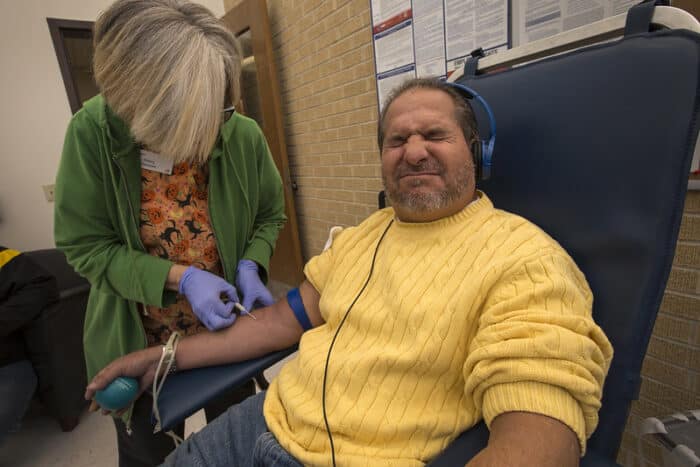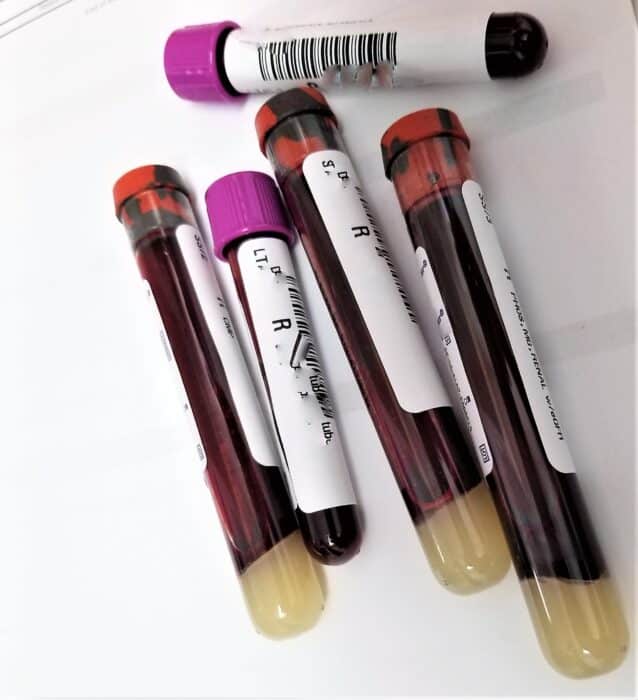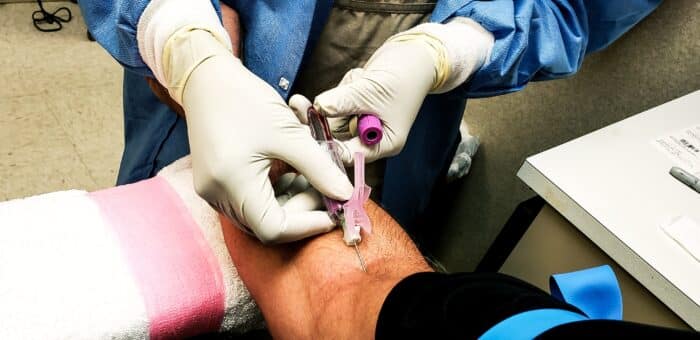Are you someone who is interested in entering the world of healthcare, but the thought of spending years on schooling feels overwhelming?
If that is the case, phlebotomy might be the right career choice for you.
If you’re interested in pursuing phlebotomy as your career, you’ve come to the right place.
In this article, we will uncover the minimum educational requirements, the different types of phlebotomy training you can get, and more.
So, let’s dive right in.

Do You Want To Become a Phlebotomist? Check Out Free Phlebotomist Masterclass!
In our masterclass you learn:
- How to be a Phlebotomist faster…in just 2 months!
- Avoid student debt & driving to classes
- #1 thing employers want from Phlebotomists
- How to stand-apart & get a university certificate for a strong resume
What Level of Education is a Minimum Requirement to Become a Phlebotomist?
To work as a phlebotomist, you usually need to have at least a high school diploma or something like a GED certificate. Phlebotomy is a starting job in healthcare, and having a high school diploma is usually enough to begin your career in most situations.
Phlebotomist Education Requirements
As we mentioned before, even though completing a high school diploma or a GED is generally enough to start your career as a phlebotomist, it is always recommended that you get some type of phlebotomy training to become a successful phlebotomist.
The first step is to get your high school diploma or a GED, after which you can go for:
- Formal Phlebotomy Training:
Many people who want to be phlebotomists choose to take phlebotomy classes. These classes are like short courses, unlike going to a big university. In these classes, you learn how to collect blood from people safely, how to talk to patients, and other important things.
These classes usually last for a few weeks or a few months, not for years like some other jobs. They are offered by schools that specialize in job training, community colleges, or hospitals. You’ll be much better prepared for the job when you finish the class.
It is always recommended that you pick online training programs for your phlebotomy training, as they offer several advantages such as self-paced classes, 100% online courses, and cheaper tuition costs, among others.
- Phlebotomy Certification:
Getting certified is like getting a special certificate that establishes that you’re good at phlebotomy. It’s not always required, but it can be very helpful. To get certified, you need to pass a certification exam that shows you know how to do the job right.
Having a certification can make it easier to find a job because employers know you’re well-trained. It also shows that you care about doing a great job and keeping patients safe.
To become a phlebotomist, you start by finishing high school or something similar. Then, you can take special classes to learn more about phlebotomy. If you want to, you can get certified to prove your phlebotomy skills.
There are two main types of phlebotomy certification exams offered by nationally recognized organizations, such as the ASCP (American Society for Clinical Pathology) and the NHA (National Healthcareer Association).
See: How to Become a Phlebotomist
Phlebotomy Education Options
Now, you might be wondering what modes of phlebotomy training are available, and which might be the best suited for you.
Let us help you with that.
You can complete your phlebotomy training in two ways, either by choosing on-campus training or online classes. Let’s explore more about each of these types:
On-campus training:
On-campus training means you go to a physical school or college to learn phlebotomy. It’s like attending regular classes.
Here’s what you can expect:
- Classrooms: You’ll sit in classrooms with teachers and other students. This can be a good choice if you enjoy in-person learning and need hands-on practice.
- Hands-On Practice: On-campus training often includes practical sessions where you can practice drawing blood on dummy arms or real patients under supervision. This is crucial to become skilled in phlebotomy.
- Fixed Schedule: You’ll have a set schedule for classes, which can help you stay organized. It’s great if you prefer a routine.
- Interaction: You get to interact with teachers and classmates face-to-face, making it easier to ask questions and get support when you need it.
Online Phlebotomy Classes:
Online phlebotomy classes are an alternative to traditional on-campus learning.
It offers great advantages too, such as:
- Flexibility: With online classes, you can study from home or anywhere with an internet connection. This is perfect if you have other commitments, like a job or family.
- Self-Paced Learning: Online courses often allow you to learn at your own pace. You can go through the materials when it suits you best, making it easier to balance learning with your daily life.
- Interactive Content: Many online phlebotomy courses include videos, quizzes, and interactive lessons to keep you engaged and help you understand the material better.
- Support: While you won’t be in a physical classroom, you can usually reach out to instructors or classmates through email or discussion boards for help and questions.
- Clinical Component: Some online programs may require you to complete a clinical component in person. This means you’ll still need to go to a healthcare facility to get hands-on experience with real patients.
Read: How Long Does it Take to Become a Phlebotomist
Conclusion
Recognizing the significance of phlebotomist education is vital for those interested in this profession. Phlebotomists play a critical role in healthcare by ensuring accurate blood sample collection, which directly impacts patient diagnosis and treatment.
Therefore, investing in education not only benefits their careers but also contributes to the overall quality of patient care. In this constantly evolving field, staying updated with the latest techniques and technologies is crucial, emphasizing the importance of continuous education and professional growth for phlebotomists at all stages of their careers.
Related Resources:
- Phlebotomist Salary
- Phlebotomist Skills
- Phlebotomist Job Description
- Phlebotomist Duties
- Where Can a Phlebotomist Work?
- Phlebotomy Externship
- What Jobs Can I Get With a Phlebotomy Certificate?
- How Long is a Phlebotomy Course?
- Phlebotomist vs CNA
- Phlebotomist Training
- Phlebotomy Course – See this Before Enrolling
- Certified Phlebotomy Technician
- Cardio-Phlebotomy Technician
- Online Phlebotomy Classes
- Order of Draw Phlebotomy
- Phlebotomy Internship
- 4-Week Phlebotomy Classes Online
Related Articles
-
How to Be Successful in College in 2022 – 7 Simple Tips to Succeed
-
How Do Scholarships Work? Read This First…Truth is Shocking
-
7 Best College Majors 2024: What Should I Major In?
-
How to Choose a College – 10 Things You Must Consider in 2024
-
Why Go to College? Top 13 Benefits for Adult Students in 2022
-
Top 5 Best Alternatives to Community College for 2024








